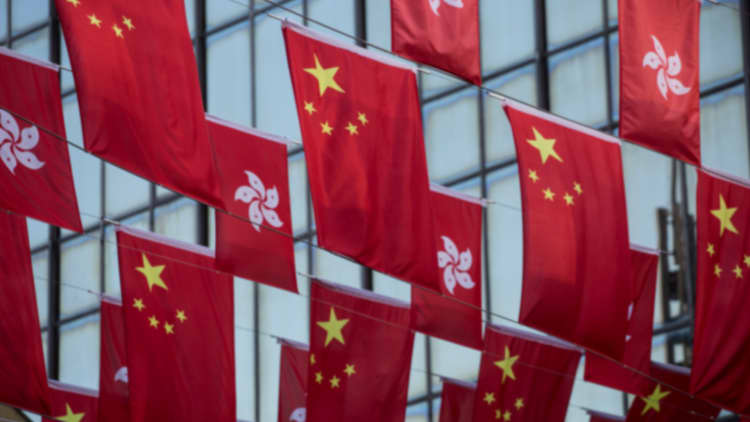Hong Kong's legislative council election will be postponed by a year, the city's leader Carrie Lam announced Friday amid a new surge in coronavirus cases.
The vote was initially scheduled to take place on Sept. 6 but will now take place on Sept. 5, 2021, according to Lam. She said that central government supported the decision and it was taken to safeguard people's health.
"The announcement I have to make today is the most difficult decision I've had to make in the past seven months," Lam said at a news conference, according to the Associated Press.
"We want to ensure fairness and public safety and health, and need to make sure the election is held in an open, fair and impartial manner. This decision is therefore essential," she said.
As of July 30, authorities reported 149 additional cases of Covid-19, bringing the city's total to at least 3,151, according to the city's health department.
Hong Kong was initially hailed for its response to the pandemic, and was able to avoid widespread lockdowns that many countries imposed to stem the spread of the disease. However, the coronavirus reemerged and confirmed cases reached new daily highs in recent weeks.
The postponement of the election came after Hong Kong authorities announced Thursday that 12 pro-democracy nominees have been disqualified from running in the upcoming elections. Among them was high profile activist, Joshua Wong, and incumbent lawmakers Dennis Kwok and Alvin Yeung.
According to Hong Kong law, an election can be postponed if the city's chief executive believes it is likely to be "obstructed, disrupted, undermined or seriously affected by riot or open violence or any danger to public health and safety." Voting typically has to take place within 14 days of the original date, but the city's leader also has power to make regulations when there are "occasions of emergency or public danger."
The disqualification of the pro-democracy candidates drew criticism overseas, including British Foreign Secretary Dominic Raab who slammed the move.
In a statement on the U.K. government's website, Raab said it was "clear they have been disqualified because of their political views, undermining the integrity of 'One Country, Two Systems' and the rights and freedoms guaranteed in the Joint Declaration and Hong Kong's Basic Law."

Hong Kong has been ruled under the "one country, two systems" policy since the former British colony returned to Chinese rule in 1997. That framework grants the Chinese territory a largely separate economic and legal system, and allows those living there limited election rights.
Rumors of a delay of the election were already swirling even before the announcement.
U.S. Secretary of State Mike Pompeo on Thursday urged Hong Kong to proceed with the elections as planned.
Following local media reports on a possible delay, pro-democracy activist Wong, said on Twitter that "using (the) pandemic as an excuse to postpone the election is definitely a lie."
He said hygiene measures can be stepped up to lower the risk of infection during voting.
The government reimposed social distancing rules and tightened the restrictions further this week. The measures were tougher than those introduced when the health crisis first emerged in the early part of the year.
Dine-in services were suspended and gatherings of more than two people were banned in late July, while face masks were made mandatory in all public places.
"But the (government) knows only to interfere with the election that used to be free and fair, either disqualifying my candidacy or to call off the election," Wong said on Twitter.
The September election would have been the city's first since its controversial national security law came into effect at the end of June. Beijing said the law is meant to prohibit secession, subversion of state power, terrorism and foreign interference, but critics feared it would be used to crush dissent.
An unofficial primary in July reportedly saw over 600,000 people show up to cast a symbolic vote, according to Reuters, which cited the opposition camp.
Anyone convicted of an offence under the new national security legislation cannot stand as a candidate in elections for the legislative council or district councils.


